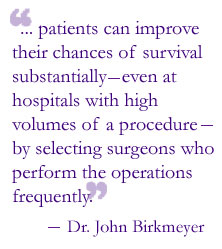
|
For Release: November 26, 2003 5 p.m. ET
Contact: DMS Communications (603) 650-1492
Print Version
Experience Counts for Successful Surgical Outcomes
Hanover, NH - Seeking out surgeons who frequently perform certain cardiac or cancer-related operations may increase patients' odds of surviving major surgery, according to a study published in the November 27 issue of the New England Journal of Medicine.

Researchers led by Dr. John D. Birkmeyer, associate professor of surgery at Dartmouth Medical School and chief of general surgery at Dartmouth-Hitchcock Medical Center, examined outcomes from eight commonly-performed cardiovascular procedures or cancer resections. Their findings reveal that patients of high-volume surgeons had lower death rates than did patients whose surgeons performed these operations less frequently.
The work builds on previous research Birkmeyer and others conducted that has demonstrated the link between hospitals with high annual volumes of certain types of surgical procedures and positive patient outcomes. However, this is the first major study to look at the relative importance the experience of the operating surgeon can have on surgical patient death rates.
"For years, we've known that patients facing surgery are best served if they choose a hospital with high volumes for that specific surgical procedure," Birkmeyer said. "What this shows though, is that patients can improve their chances of survival substantially--even at hospitals with high volumes of a procedure--by selecting surgeons who perform the operations frequently."
In a separate study published in the November 26 issue of the Journal of American Medical Association (JAMA) Birkmeyer and fellow researchers demonstrated that allowing Medicare patients to select hospitals with high volumes for certain surgical procedures would not present an unreasonable travel burden for patients.
Using Medicare data, for the the research team examined mortality rates for 474,000 patients who had undergone heart bypass surgery, carotid endarterectomy--an operation to prevent stroke--lung or pancreatic resection, aortic valve replacement, repair of abdominal aortic aneurysm, esophagectomy, or cystectomy.
In some procedures, they report in the New England Journal article, the linkage between outcome and surgeon experience was striking. For example, the likelihood of operative death for low-volume surgeons' patients was 24 percent greater for lung resection--an operation in which part or all of a lung is removed--and nearly four times greater for pancreatic resection surgery, as compared with patients of high-volume surgeons.
Moreover, the study findings suggest that high-volume surgeons' patients had lower death rates even when operated on in low-volume hospitals, while the patients of low-volume surgeons had higher death rates regardless of where they had their surgery.
In the study, high-volume surgeons performed an average of more than 162 heart bypass operations a year, compared with fewer than 101 a year by low-volume surgeons, and over 40 carotid endarterectomy operations annually as opposed to the fewer than 18 performed by low-volume surgeons. High-volume surgeons also performed an average of more than 17 lung resections and more than four pancreatic resections annually, compared to fewer than seven and two, respectively, by low-volume surgeons. The researchers defined surgical mortality as death during the procedure, before hospital discharge, or within 30 days of the operation. They adjusted their findings to take into account personal factors that could affect odds of surviving major surgery, such as patients' age, sex, race, average income, presence of other illnesses and whether the surgery was done as an elective or emergency procedure.
Again using Medicare, Birkmeyer and his colleagues analyzed how far Medicare patients would have to travel if they opted or were required to have specific operations on their esophagus or pancreas in high-volume hospitals.
Their findings, they report in JAMA, indicate that requiring patients to undergo these high-risk procedures at hospitals with minimum volume standards (defined as hospitals where one or more pancreatectomies and two or more esophagectomies are performed annually) would affect about 15 percent of patients undergoing these surgeries and would add fewer than 30 minutes to most patients' travel time.
"For many surgical procedures, operative mortality (death) rates are substantially lower at hospitals that perform them more frequently," the authors write. "As a result, concentrating selected procedures in higher-volume hospitals is advocated by many. ... Previous analyses suggest that such regionalization policies could avert hundreds, if not thousands, of surgical deaths each year in the U.S."
The simulated trial was based on Medicare claims for more than 15,000 patients who had either esophagectomy or pancreatic resection between 1994 and 1999.
Both studies were funded in part by a grant from the Agency for Healthcare Research and Quality and the Center for Medicare and Medicaid Services.
For further information, contact Deborah Kimbell (603) 653-1913 Deborah.Kimbell@hitchcock.org